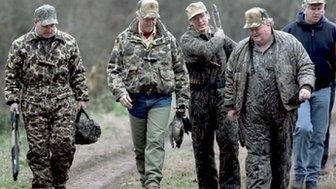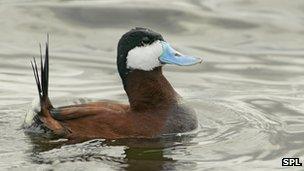Just quackers: Hunting decline lands ducks in the soup
- Published
- comments

The numbers of duck hunters in the US is declining but it may not be good news for the birds.
A farming friend of mine makes a wry point about the evolution of cattle.
He says that despite their dumb reputation they have adopted an extremely successful survival strategy - by making themselves tasty to meat-eating humans.
The introduction of horse into that equation hasn't changed this fundamental point.
Another species that humans like to eat is duck. Unfortunately for the duck, humans like to hunt them as well, for what some call "sport".
But while many people find hunting repugnant, new research from the US suggests that shooting ducks has actually been rather good for the species.
Glory days for ducks
Dr Mark Vrtiska and colleagues at the Nebraska Game and Parks Commission recently published research, external in the Wildlife Society Bulletin saying that organised and licensed hunting has boosted the amount of money being spent of conservation.
More than two million hunters paid for a "duck stamp," a federal licence to shoot the creatures in the 1970s. The researchers say that 98% of the money raised is spent on purchasing or leasing habitat within the National Wildlife Refuge System.
According to Dr Vrtiska this has had a hugely beneficial impact on the birds.

Former President Bill Clinton took part in duck hunting expeditions while in office.
"The waterfowl population has passed 40 million six times since 1995. These should be glory days for duck hunting" he said.
But there are clouds on this happy horizon. Sales of duck stamps are declining, down to 1.3m in 2008, and they continuing to fall by around 30% annually.
In the good old days the number of hunters and the number of birds rose and fell in balance with each other. But no longer.
"Because the relationship appears to be broken we've lost a lot of funding and in turn lost a lot of habitat conservation on the ground," Dr Vrtiska told me.
"The carrying capacity of the lands to produce ducks is going to be significantly reduced without that conservation funding being there."
Good weather for ducks
The problem is there hasn't been enough good weather for ducks. Drought has had a significant impact across the US in the past few years. The duck stamp money helped construct the right types of habitat so that when it did eventually rain, the birds were able to reproduce successfully.

The sale of licences to hunt ruddy ducks and other birds raises millions of dollars.
"You can't buy rain, but the money allows you to set the table," says Dr Vrtiska.
The researchers aren't optimistic that the numbers of duck hunters will ever rise again, due to changing cultural and social factors. So the scientists are seeking other ways to boost revenues. They are discussing different types of licences, for people to shoot birds, but not just with guns.
"We have to be more amenable to different levels of participation, for people to shoot, view or hunt - We are trying to find innovative solutions - perhaps a basic stamp to go and view birds, perhaps a more expensive full season ticket for hunting," he added.
Is this just about preserving the rights of people to blast the birds from the sky?
"It's about preserving ducks, habitats and the tradition of hunting. They are inter-dependant, I don't see how to get around one without the other two."
Follow Matt on Twitter, external.